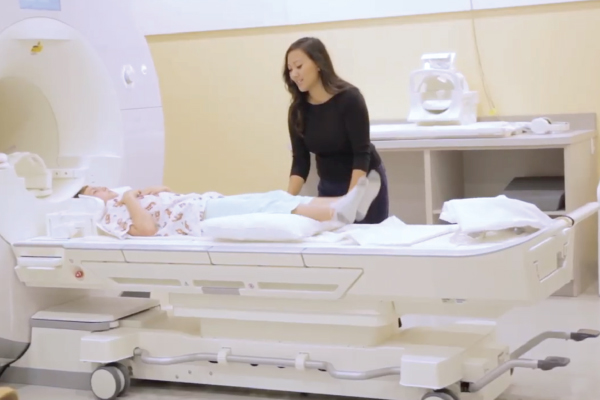Government Relations
Inside Grants: National Science Foundation Graduate Research Fellowship

Image: Kathy Do preparing an adolescent participant for a fMRI scan at the Biomedical Research Imaging Center at the University of North Carolina at Chapel Hill.
The U.S. National Science Foundation (NSF) is one of the premier funders of basic research. NSF comprises seven directorates, including the Directorate for Social, Behavioral, and Economic Sciences and the Directorate for Education and Human Resources, which provide critical support to psychological scientists. In 2020, NSF’s budget was $8.3 billion USD.
Grant Information
- Country: United States
- Organization: National Science Foundation
- Grant Mechanism: Graduate Research Fellowship Program (GRFP)
- Amount: Annual stipend of $34,000 and a cost of education allowance of $12,000 to the institution.
The Graduate Research Fellowship Program (GRFP) invests in the United States’ future scientists, helping to advance their research careers and graduate educations. The program provides roughly 2,000 awards every year to individuals pursuing research-based master’s or doctoral degrees in science, tech, engineering, and math.
Kathy Do recently completed her PhD in psychology and neuroscience at the University of North Carolina at Chapel Hill under the mentorship of Eva Telzer. She will be starting a postdoctoral fellowship this summer at the same university, where she will work in the Developmental Personality Neuroscience Lab led by Michael Hallquist. Throughout graduate school, Do was actively involved in several departmental and university initiatives aimed at promoting diversity in and the accessibility of science, a goal that resonates with her as a female, ethnic-minority, first-generation student.

Kathy Do
What are you researching?
My research examines the neurocognitive mechanisms by which adolescents learn and use information from their social environment during decision making. I am particularly interested in understanding how susceptibility to social influence interacts with social context and developmental timing to confer risks and benefits for the health and well-being of youth. To answer these questions, I use experimental, neuroimaging, and longitudinal methods to characterize the role of brain development in adolescents’ sensitivity to and navigation of their changing social landscape.
My dissertation work with Eva Telzer examined how parents and peers influence risky decision making across social contexts and across development. In my postdoctoral work with Michael Hallquist, I’ll explore how internal processes, such as valuation and cognitive control, interact and inform social decision making in young people. These latter efforts are motivated by a new conceptual framework that I proposed with my colleagues to formalize the complex learning and decision-making algorithms that explain how social influence affects brain and behavior across development.
How has the NSF GRFP supported your research and training?
The NSF GRFP has given me the independence to explore and pursue my research interests, stay engaged in mentoring young people, and continue to publish and share my findings at conferences and within my community. The dedicated research time has afforded more opportunities to learn innovative and rigorous statistical methods that capture adolescent development, as well as build upon my multidisciplinary training by developing research collaborations across labs and universities.
What was the application process for the GRFP like?
My application process was one of perseverance: I applied once before graduate school and twice in graduate school (now limited to once as a graduate student), ultimately receiving the NSF GRFP on my third try. The application required a personal statement (three pages) and research proposal (two pages). To help craft my statements, I sought example materials from past NSF GRFP awardees in my department, as well as feedback from colleagues and mentors on many drafts. I wanted to apply to the NSF GRFP because I was impressed by its extensive network of fellows and resources/support and its commitment to funding scholars whose research will directly benefit society.
What advice do you have for researchers applying for the GRFP?
I think the hardest part of applying to the GRFP (or any grant/fellowship) is effectively communicating the “how” and “why” of your research to others who can support and benefit from this work. When crafting your statements, remember why you are excited about your research questions, who stands to benefit from discovering those answers, and what makes you the best person to conduct that research. And don’t give up on your ideas—a different funding mechanism may be a better fit in the end!
Feedback on this article? Email [email protected] or scroll down to comment.
Further reading
Do, K. T., McCormick, E. M., & Telzer, E. H. (2020). Neural sensitivity to conflicting attitudes supports greater conformity toward positive over negative influence in early adolescence. Developmental Cognitive Neuroscience. Advance online publication. https://doi.org/10.1016/j.dcn.2020.100837
Do, K. T., Sharp, P. B., & Telzer, E. H. (2020). Modernizing conceptions of valuation and cognitive-control deployment in adolescent risk taking. Current Directions in Psychological Science, 29(1), 102–109. https://doi.org/10.1177/0963721419887361
Follow the APS Guide for the NSF Graduate Research Fellowship Program.





APS regularly opens certain online articles for discussion on our website. Effective February 2021, you must be a logged-in APS member to post comments. By posting a comment, you agree to our Community Guidelines and the display of your profile information, including your name and affiliation. Any opinions, findings, conclusions, or recommendations present in article comments are those of the writers and do not necessarily reflect the views of APS or the article’s author. For more information, please see our Community Guidelines.
Please login with your APS account to comment.